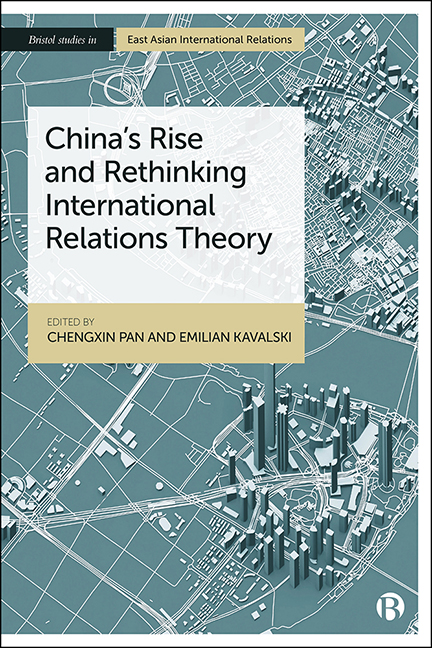Book contents
- Frontmatter
- Contents
- List of Abbreviations
- Notes on Contributors
- Acknowledgements
- Introduction: The Rise of China and Its Challenges to International Relations Theory
- PART I Theorizing China’s Rise: Beyond Eurocentric Knowledge Production
- PART II Theorizing China’s Rise: Critical Reflection on Mainstream Frameworks
- Epilogue: Towards International Relations beyond Binaries
- Index
Introduction: The Rise of China and Its Challenges to International Relations Theory
Published online by Cambridge University Press: 15 September 2022
- Frontmatter
- Contents
- List of Abbreviations
- Notes on Contributors
- Acknowledgements
- Introduction: The Rise of China and Its Challenges to International Relations Theory
- PART I Theorizing China’s Rise: Beyond Eurocentric Knowledge Production
- PART II Theorizing China’s Rise: Critical Reflection on Mainstream Frameworks
- Epilogue: Towards International Relations beyond Binaries
- Index
Summary
Introduction
The development of International Relations (IR) theory is closely bound up with significant events and tectonic shifts in world politics (Acharya and Buzan, 2017: 12). Such watershed moments often prompt IR scholars to recalibrate their frameworks of analysis to better make sense of a changing world. In the 1930s, modern realism emerged ‘as a reaction to the breakdown of the post-World War I international order’ (Wohlforth, 1994/95: 91). In the last decade of the 20th century, the abrupt end of the Cold War saw both a fall in realism's fortune, and the opening of new space for theories from a broadly defined post-positivist persuasion (Lapid, 1989; Smith, Booth and Zalewski, 1996). Emerging out of the ensuing Third Debate between positivist and post-positivist theories (or between what Robert Keohane calls ‘rationalist’ and ‘reflectivist’ approaches, see Keohane, 1988), constructivism has since become a new fixture in the IR theory landscape (Guzzini, 2000). Thus, ‘although indirect, the connection between events and theory was undeniable’ (Wohlforth, 1994/95: 91).
Interestingly, such a supposedly undeniable link is yet to clearly emerge in the case of an ongoing major ‘event’ in contemporary international relations, namely, the rise of China. At one level, there is no denying that China's rise has been one of the most frequently studied and debated contemporary phenomena (Kang, 2007; Lampton, 2008; Kavalski, 2009; Nathan and Scobell, 2012; Pan, 2012; Shambaugh, 2013; Christensen, 2015; Mahbubani, 2020; Breslin, 2021). In the rapidly proliferating literature on China's rise, there has been no shortage of theoretical perspectives being brought to bear on a number of pressing questions: can China rise peacefully? What does it mean for global governance and the rules-based liberal order? Will it seek regional or even global dominance? And can it avoid the so-called Thucydides Trap? But most of these inquiries, instead of allowing for new theoretical explorations, are already underpinned by existing theoretical assumptions. Although a wide range of IR theories such as realism, liberalism, constructivism, power transition theory, and the English School (ES) have shed light on China's rise, their understanding is primarily about applying existing theories to a perceived empirical case in order to explain its policy and practical implications and/or to test the validity of those theories. Very rarely has China's rise been treated as an ‘up-stream’, theory-generating event in IR.
- Type
- Chapter
- Information
- Publisher: Bristol University PressPrint publication year: 2022



